Hero Dog Leaves Lasting Legacy
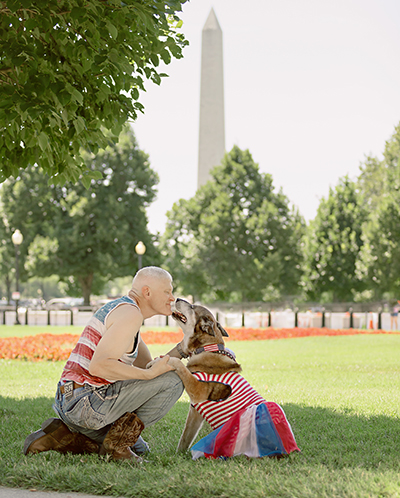
Veterans find purpose, meaning from bonding with dogs
“She always had my six.”
Eric Haynes struggled with his emotions and how to deal with life once he left the military. While the burdens of war had taken its toll on him physically, it was the mental exhaustion that really upended his life. He had trouble relating to people, feeling comfortable in public places, or even engaging in what he loved most – writing and performing music. Some days, he thought he couldn’t take it anymore. On a few of those days, he attempted to make it all go away.
His mental health improved in 2018, when Eric met Ciara, his K-9 hero. The two met at a songwriters’ workshop in rural Georgia. Eric had started coming out of his shell after finding support through Wounded Warrior Project® (WWP), and a specialist with WWP Talk had suggested he look into getting a service dog. Whether it was coincidence or fate, shortly after that, Eric met Ciara by happenstance and immediately bonded.
Ciara became more than Eric’s canine companion. She was his best friend, his therapist, the one who helped him overcome his post-traumatic stress disorder (PTSD) symptoms and give him a new “leash on life.” When the two found each other, they both found their lifeline. They traveled the world together, seeing concerts, going on cruises, performing on stage, and sharing the story of their bond and recovery with other veterans. Shortly before Memorial Day 2022, Eric lost Ciara, but the love and lessons she gave him will last.
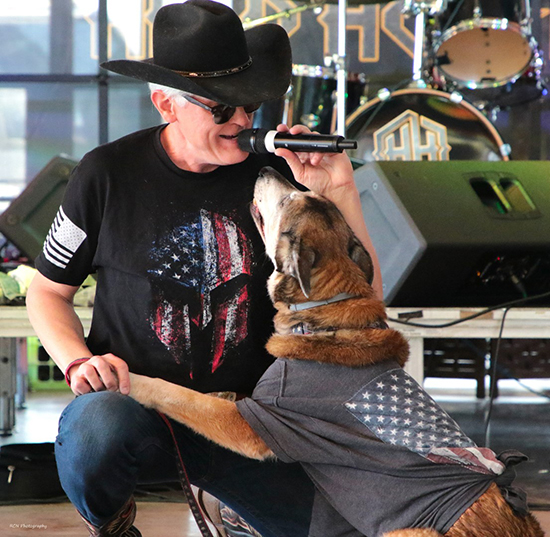
“As much as you never want to lose them, I am blessed that she didn't suffer,” Eric said. “She was just so at peace. She never really asked anything. I loved her unconditionally and she loved me unconditionally in return. She was just always there.”
Ciara was Eric’s angel in life, and his guardian angel after. He credits her with giving him the strength to go out and live his life again. Since having Ciara to share experiences with and build his confidence, Eric was able to write and perform music again. He found himself live on stage, making music videos, and auditioning for talent shows. He got engaged to Donna, who Ciara immediately approved of. The two will marry in December. The pre-Ciara Eric didn’t feel like he had a place in the world. The post-Ciara Eric felt he could conquer the world.
As Eric and Ciara prove, the bond between veterans and dogs can have a lasting, positive impact on all parties.
The Warrior-Canine Connection
The impact Ciara had on Eric’s life is hardly a surprise to those who work with service animals. Merely being in the company of a dog can reduce feelings of loneliness, decrease stress, and increase physical exercise. It can be especially beneficial to veterans, who often deal with symptoms of PTSD, including depression and anxiety, as well as the loss of a sense of purpose after leaving the service.
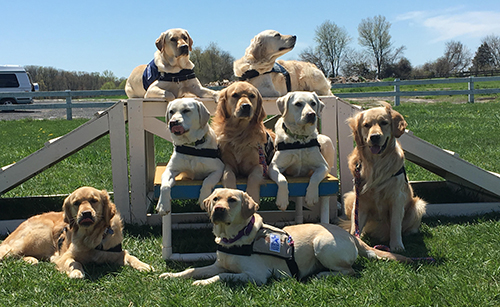
This reality is the basis for the mission of Warrior Canine Connection, a community partner of WWP. Warrior Canine Connection uses a mission-based trauma recovery model to help veterans “reconnect with life, their families, their communities, and each other.”
Dogs with Warrior Canine Connection are trained from birth exclusively by veterans to help prepare them to serve as service dogs to injured veterans. Because training a service dog can take up to two years, and not all dogs can work as service dogs, there’s a long wait list. It’s usually very rare to get a trained service dog right away. Through Warrior Canine Connection, veterans can benefit from interaction with a single dog, while also having the knowledge that they’re helping a fellow service member by training a dog that will be paired with a veteran in need.
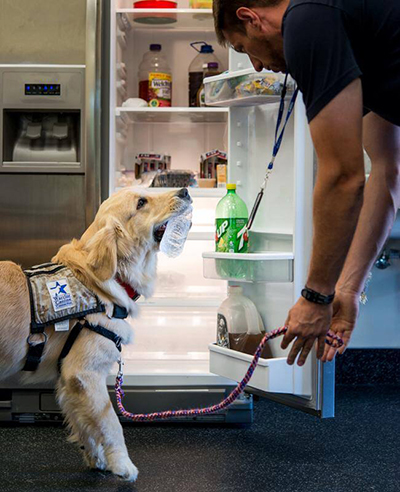
“What’s different about our program is that while our dogs are in training they work with and are trained by veterans receiving care for invisible wounds of war,” said Jennifer Wilder, director of development for Warrior Canine Connection. “We're able to take one dog and really amplify the impact that it can have on veteran recovery and rehabilitation. In addition to the one veteran [the dogs] serve forever, they serve so many others.”
The therapeutic benefit dogs provide is shared with warriors doing the training.
“Some veterans might be averse to getting psychiatric help or psychological help or just sitting and talking with someone,” said Brady Wilks, external relations manager for Warrior Canine Connection. “When you say, ‘I need you to help me work with this dog for your brother and sister in arms,’ they're more engaged in that as a potential for treatment, so they start working at it.”
Training the dogs also requires veterans to do things they may have been uncomfortable doing previously as well as combat some of the symptoms associated with PTSD.
“Not only are they a great pal, but they truly allow veterans to be able to function more effectively in society, helping to reduce anxiety, so that they can be in busy public places that they've avoided for years,” Jennifer said. “Trying to make sure the dog feels comfortable and performs well is also challenging your own intrusive thoughts and requires being in the moment with the dog.”
The training program is eight weeks. More than 6,000 veterans have gone through the animal assistance therapy program and 114 dogs have been placed with warriors. One of the biggest struggles veterans have when leaving the military and returning to civilian life is no longer having a specified mission or feeling of service to others. Warrior Canine Connection’s program helps fill that void.
“You'll oftentimes hear that [training the dogs] brings back a sense of purpose and a sense of community involvement again,” Brady said.
Learn more about WWP’s Community Partnerships here.
Honoring a Hero
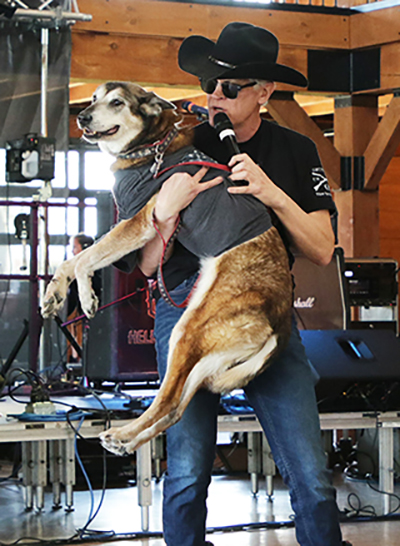
Ciara didn’t just have an impact on Eric. Like the philosophy behind Warrior Canine Connection’s mission, one dog can spread a lot of comfort to a lot of people. Ciara did that for nearly everyone she came in contact with.
“That's really what [Ciara and I] did; take those special moments and share with people,” Eric said. “[Ciara and I] helped show people life isn't always easy, but when you can take from those hard moments in life, you can make a difference with them, and you can help others.”
Eric knows Ciara’s absence will leave a hole in his heart, but he also knows she gave him the confidence to pursue his dreams. He still performs live shows, and is working on a music video, as well as auditioning for America’s Got Talent. Every endeavor is something he knows he probably wouldn’t have been able to do if it hadn’t been for the unconditional love and support of his best friend.
Eric recalls their last performance together. He was singing on stage, a song inspired by and dedicated to Ciara, one he’d sung maybe hundreds of times. For some reason, on this day, he had tears well up in his eyes as he sang it. Something made him go to Ciara and pick her up in his arms.
“I'm holding her, and she's smiling,” Eric said. “And she's just looking out. And she's at such peace and then she's just looking at me, and I'm looking at her. I did not know that this would be our last dance.”
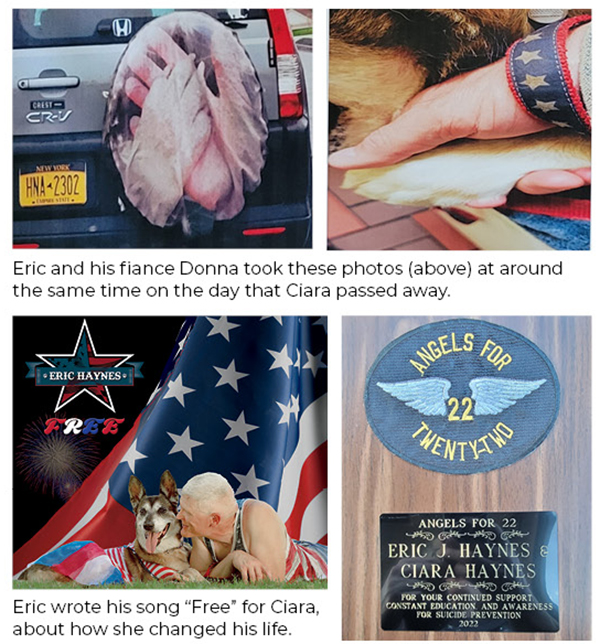
Shortly after that event, Eric heard Ciara fall and found her struggling to get back up. He rushed her to the vet, where his daughter joined him. He was able to hold her paw and be there with her in her final moments. At the same time, his fiancé Donna was on her way home from work. During a stop at a red light, she noticed the image on the wheel well on the truck in front of her. It was a human hand with a paw print over it and the word, “faith, hope, and love.” A message from Ciara, no doubt.
After Ciara’s passing, veteran groups paid tribute through parades and plaques. An organization, 60 For 60 Mohawk Run, presented Eric its “Angels for 22” plaque honoring him and Ciara for their service and support and work on veteran suicide prevention. Eric shared his and Ciara’s story as well as discuss overcoming his suicidal ideation during a YouTube talk.
“The impact she made was not only sharing joy and showing joy but allowing me to be able to do what I do, and to be able to be a voice for others and have the platform that we do now,” Eric said. “I would not be here if not for her.”
Learn more about how WWP works with partner organizations to serve the needs of veterans.
Contact: — Paris Moulden, Public Relations, pmoulden@woundedwarriorproject.org, 904.570.7910
About Wounded Warrior Project
Since 2003, Wounded Warrior Project® (WWP) has been meeting the growing needs of warriors, their families, and caregivers — helping them achieve their highest ambition. Learn more.